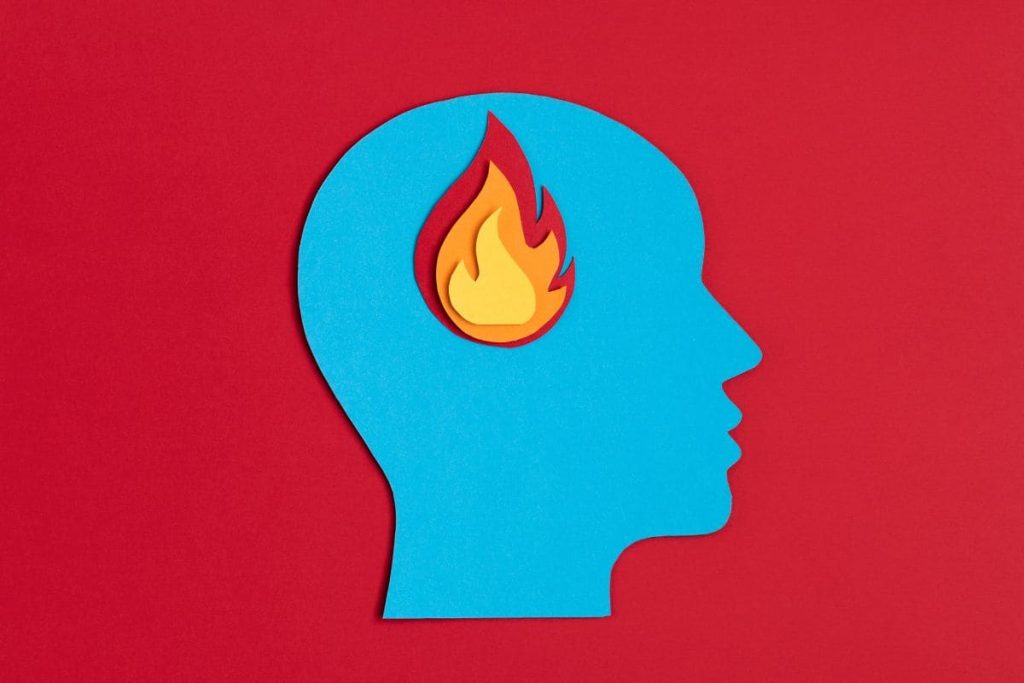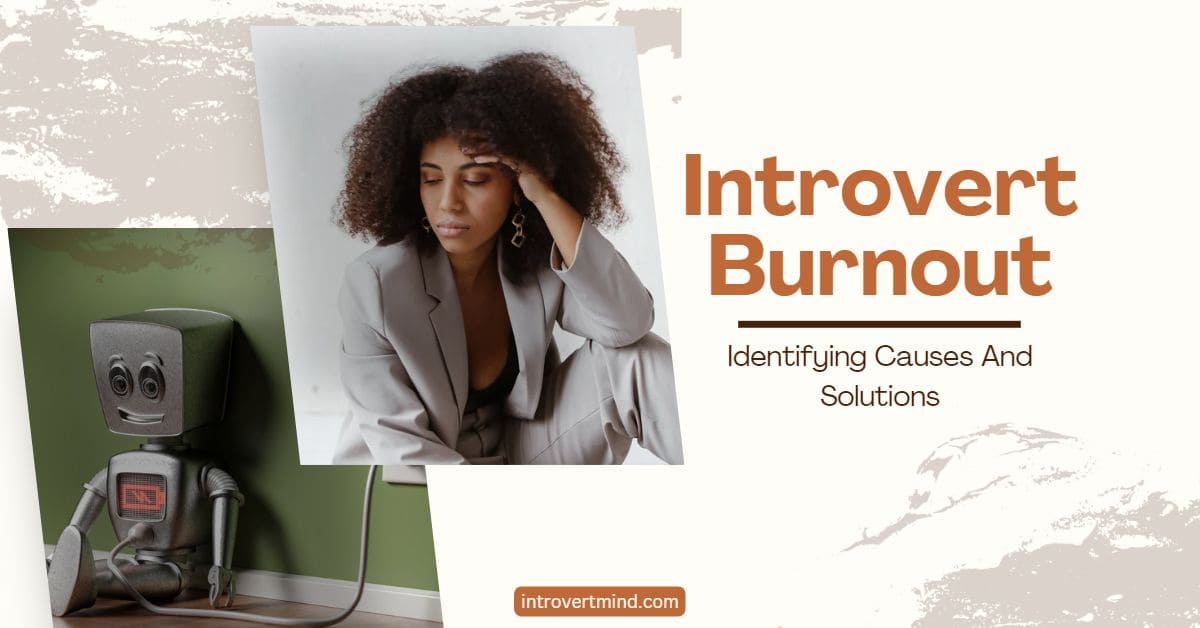In today’s fast-paced, highly connected world, introverts can often experience mental and emotional exhaustion, commonly referred to as introvert burnout.
This feeling of deep fatigue can negatively impact various aspects of an individual’s life, from work productivity to social relationships. As a result, it’s essential to understand the causes, symptoms, and potential coping strategies for introvert burnout.
Introvert burnout occurs when introverts, who require solitude to recharge, aren’t able to get enough quiet time to balance their energy levels. Life’s demands sometimes require introverts to extend themselves beyond their comfort zones, which can be draining.
Prolonged periods of excessive socializing or work pressure might lead to a state of complete exhaustion, making it especially critical for introverts to recognize when they’re approaching their limits and take necessary steps to maintain their mental well-being.
Understanding Introvert Burnout

Introvert burnout is a state of mental and emotional exhaustion experienced by introverted individuals due to excessive social interactions or prolonged periods of high stimulation. It is especially prevalent in environments that cater to extroverted traits or in situations where introverts are expected to maintain social engagement beyond their comfort levels.
Some symptoms of introvert burnout may include:
- Feeling tired or drained even after resting.
- Difficulty concentrating or making decisions.
- Increased irritability or sensitivity to stimulation.
- Desire to withdraw from social situations.
Differences Between Introversion And Extroversion
Introversion and extroversion are two ends of a personality spectrum that describe a person’s preference for social interaction and their ability to gain or expend energy in different situations. Extroverts tend to feel energized in social environments, while introverts may prefer solitude or smaller gatherings to recharge their energy.
The key differences between introverts and extroverts include:
| Introvert | Extrovert |
| Recharges through solitude or quiet activities | Recharges through social interactions and high-energy environments |
| May find social settings draining | Thrives in social settings |
| Usually prefers deep and meaningful conversations | Enjoys small talk and a wide range of social encounters |
| Often careful and reflective decision-makers | Quick and bold decision-makers, comfortable with taking risks |
Causes Of Introvert Burnout

Introvert burnout occurs when introverts become mentally, emotionally, and physically exhausted due to a variety of factors. In this section, we will discuss three main causes of introvert burnout: Environmental Factors, Social Interactions and Expectations, and Lack of Alone Time.
Environmental Factors
Environmental factors play a significant role in causing introvert burnout. Introverts are sensitive to external stimuli, such as noise, crowds, and bright lights. These factors can contribute to their stress levels and accelerate burnout.
Some common environmental stressors for introverts include:
- Noise pollution from traffic or loud environments.
- Crowded spaces, such as busy offices or public transport.
- Bright lights, which can cause sensory overload.
Social Interactions And Expectations
Introverts often struggle to navigate high-pressure social situations and can experience burnout as a result. Society’s extrovert-oriented expectations can put stress on introverts, who may feel pressured to socialize or participate in events that are draining for them.
Some common social stressors for introverts include:
- Large group events, like parties or conferences.
- Small talk, which is often seen as superficial and draining.
- Public speaking or having to present in front of a crowd.
Lack Of Alone Time
One of the significant causes of introvert burnout is the lack of alone time. Introverts recharge their energy levels by spending time alone, engaging in solitary activities like reading, writing, or hobbies. However, life’s demands can lead to limited opportunities for introverts to have some quiet time, which can cause burnout.
To prevent introvert burnout, it is essential to:
- Establish personal space and boundaries.
- Allocate time for solitude and relaxation daily.
- Be vocal about one’s needs, such as requesting quiet time.
Signs And Symptoms Of Introvert Burnout

Introvert burnout can manifest itself in various ways. Recognizing the signs and symptoms can help individuals take the necessary steps to prevent or manage it. In this section, we will examine the physical, emotional, and cognitive symptoms of introvert burnout.
Physical Symptoms
Introverts experiencing burnout may notice one or more of the following physical symptoms:
- Fatigue
- Headaches or migraines
- Muscle tension or pain
- Sleep disturbances
- Decreased immunity, leading to frequent colds or illnesses
Emotional Symptoms
Burnout can also affect an introvert emotionally. Some common emotional symptoms include:
- Feeling overwhelmed or drained
- Increased irritability or frustration
- Higher levels of anxiety or stress
- Feeling detached or disconnected from others
- Decreased enjoyment in activities that were once pleasurable
Cognitive Symptoms
Finally, introvert burnout can lead to cognitive symptoms, such as:
- Difficulty concentrating or focusing
- Forgetfulness or memory lapses
- Indecision or difficulty making decisions
- Decreased creativity or problem-solving abilities
- Constant mental fatigue or feeling “foggy”
By recognizing these signs and symptoms, introverts can better understand their current state and take appropriate action to recharge and recover.
Coping Strategies And Techniques

Introvert burnout can be challenging, but there are effective coping strategies and techniques that can help manage it. Let’s explore some of these strategies in the following sub-sections.
Establish Boundaries
Setting clear boundaries with others is essential for introverts to prevent burnout. Boundaries can include:
- Allocating personal time for recharging
- Communicating your needs clearly to friends and family
- Limiting access to work-related tasks during non-work hours
Regularly reassess and adjust these boundaries to maintain a balance between social interaction and personal space.
Create A Self-Care Routine
Self-care is crucial for every introvert to avoid burnout. Establishing a self-care routine can help maintain a healthy level of social engagement. Examples of self-care activities include:
- Taking regular breaks from screens and social media
- Engaging in relaxing hobbies, such as reading or gardening
- Exercising regularly to release stress
- Getting enough sleep each night
A personalized self-care routine can make a significant difference in maintaining mental and emotional well-being.
Practice Mindfulness
Mindfulness techniques can help introverts stay connected to their present feelings and experiences, helping them avoid burnout. Some mindfulness practices include:
- Meditation
- Deep breathing exercise
- Practicing gratitude by listing daily positive experiences
Regularly practicing mindfulness can assist in maintaining focus and mental clarity during social interactions.
Seek Support
Introverts might also consider seeking external support to prevent and manage burnout. This can include:
- Talking to friends or family members about their struggles
- Joining a support group for introverts
- Consulting with a mental health professional
Remember, it is okay to ask for help when dealing with burnout. Seeking support can provide valuable resources and tools to manage introvert burnout effectively.
Preventing Future Burnout

Ready to safeguard your energy and avoid introvert burnout in the future? Let’s explore some effective strategies to maintain your inner equilibrium and keep burnout at bay.
Know Your Limits
Understanding your boundaries is essential for introverts to prevent burnout. It’s important to recognize when you are nearing your limit of social interaction or mental energy. Be aware of the signs that suggest you need a break, such as feelings of exhaustion or increased irritability, and take action to recharge as needed.
Balancing Social And Personal Time
Striking a balance between social and personal time is crucial in helping introverts avoid burnout. Be deliberate in scheduling regular, dedicated time for self-care and reflection. Nurture your introverted side by engaging in activities that you enjoy and that help you relax and rejuvenate.
- Reading a good book
- Going for a walk in nature
- Journaling or creative writing
- Meditation or mindfulness practice
Also, maintain open communication with friends and family so they understand your need for alone time.
Develop Resilience
Building resilience can help introverts better manage potential burnout situations. Strengthen your coping skills and mental flexibility by practicing self-awareness, gratitude, and empathy. Additionally, developing healthy habits such as regular exercise, adequate sleep, and a balanced diet can contribute to increased mental and physical resilience.
Remember that it’s okay to ask for help or seek professional guidance if you consistently experience burnout symptoms.
Parting Words

Introvert burnout can be a challenging experience for those who need to recharge their energy. By understanding the signs of burnout and employing strategies to prevent it or recover from it, introverts can maintain a healthy balance in their lives.
Becoming aware of personal boundaries and listening to one’s own needs can help introverts take the necessary steps to maintain their well-being. Implementing self-care practices and incorporating a balance of social activities and solitude helps in avoiding burnout.
Creating an environment that acknowledges and respects introverts’ need for downtime can be equally important. Open communication with friends, family, and coworkers is essential to fostering understanding and support for those moments when introverts need to recharge.

